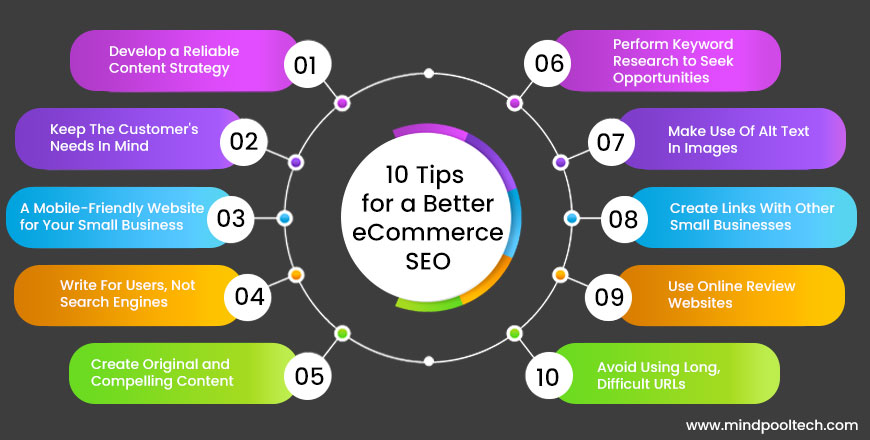
When you run an online business, it’s safe to say that your eCommerce store is crucial. If your eCommerce SEO is not well optimized to rank in search engines, your chances of attracting more customers are slim, and you will not be able to generate as much revenue as you would like. Increasing traffic to your eCommerce store is one of the best ways to reach out to new customers, but It’s easier said than done. You could use digital ads, but with Product Listing Ads (PLAs) becoming increasingly expensive, engaging in keyword bidding wars with larger eCommerce brands is out of the question. Here is where eCommerce SEO comes into play.
SEO is one of the best ways to reduce your reliance on paid channels, rank higher in Google searches, and drive more organic traffic to your website. If you’re new to eCommerce SEO or simply looking for new ways to drive traffic to your store, this article has a little something for everyone. We’ve compiled a list of eCommerce SEO best practices to assist you in optimizing your online website for high search engine rankings — and avoiding common eCommerce SEO issues.
Table of Content:
10 Tips To Improve eCommerce SEO
- Develop a Reliable Content Strategy for Your Company
- Develop With The Customer’s Needs In Mind
- Make a Mobile-Friendly Website for Your Small Business
- Write For Users, Not Search Engines
- Create Original and Compelling Content
- Perform Keyword Research to Seek Opportunities in Your Niche
- Make Use Of Alt Text In Images
- Create Links With Other Small Businesses
- Boost Your Small Business SEO By Using Online Review Websites
- Avoid Using Long, Difficult URLs
What is eCommerce SEO?
eCommerce SEO is a technique for increasing your website’s visibility on Search Engine Results Pages (SERPs). You want your page to rank as high so that it receives as many visitors as possible. To ensure that your web pages rank higher in SERPs, you must optimize your website. Everything from the keywords to the technical setup of your online store, in addition to whether your web store is mobile-friendly, all have a significant impact on SEO optimization.
What are the Benefits of eCommerce SEO?
There are numerous benefits of eCommerce SEO strategy. The following are the top three advantages of eCommerce SEO:
- Enhancing the User Experience (UX)
A positive user experience is one of Google’s key metrics. If your site targets specific keywords for your intended audience and addresses any concerns that visitors may have, Google will consider this a positive experience, and your ranking will rise as a result. If, on the other hand, users visit your website and then leave, Google will consider this a negative experience and will penalize your page ranking.
- Increasing Brand Recognition
You can improve your eCommerce site without spending money on advertising or promotions. Being displayed in Google’s answer box can boost clicks, website traffic, and brand awareness.
- Increasing the Reach of Your Website
eCommerce SEO increases website traffic, which expands your brand’s reach. You can retarget users who arrive at your website organically with paid retargeting campaigns. SEO remarketing is a highly effective strategy.
Take a look at 10 tips to help you improve your eCommerce SEO game.
Develop a Reliable Content Strategy for Your Company
To a new business owner, the words “content strategy” may appear intimidating. Creating a content marketing strategy is much easier than you might think. You must think outside the box as well as practically and must consider what your local customers need to know about your company and intend to deliver that useful information. When you achieve this, you should strive for a diverse customer base. This includes both new buyers interested in learning more about your company and repeat customers to your small business website.
Develop With The Customer’s Needs In Mind
The appearance of your website and product pages should enhance rather than detract from the purchasing experience. Even if you sell the most fashionable, desirable products in your industry at a reasonable price, a shopper will be disappointed and leave your website if it is difficult to navigate or impossible to browse.
SEO is also concerned with design. If a search engine sensor detects that your website has a very high bounce rate – that is, visitors leave immediately after first accessing a page, your rankings may begin to suffer. A well-designed website can help to reduce bounce rates and allow users to browse a few more pages even if they don’t immediately find what they’re looking for.
Your eCommerce store should be easy to navigate, with intuitive menu or navigation options that clearly state what visitors will see when they click on a link. Use images sparingly, as a long load time may cause impatient customers to click the back button. And, yes, response time is an important consideration. It is thus in your best interest to ensure that your pages load as quickly as possible.
Make a Mobile-Friendly Website for Your Small Business
Mobile phones are the most popular method of online shopping, accounting for 48% of all purchases. Because online consumers are a diverse group, you should ensure that your website is mobile-friendly in order to attract website traffic.
Consider your phone to be an SEO tool that you should use to your advantage. The number of prospects who may not visit your website if it is only accessible through a computer. When it comes to capturing your target customer, UX is everything, and there is a simple way to ensure your website is accessible to all.
Write For Users, Not Search Engines
Despite the importance of optimizing your eCommerce store for search results, everything you do with your online marketplace should eventually benefit your customers. After all, your customers are not robots! A paragraph of keyword-heavy, meaningless content may improve your ranking slightly, but it is unlikely to improve your conversion rate.
Hiring a professional copywriter who can strike a balance between content that humans want to read and content that search engines want to rank is your best bet. If you can’t afford a copywriter, you can teach yourself by attending online webinars or reading guides.
Create Original and Compelling Content
Ranking for your targeted phrases or keywords may be difficult if your eCommerce website lacks unique content or offers a limited number of products. Create some unique, engaging content to combat this and provide your customers with a reason to buy from you.
Many companies have blogs where they discuss industry news, trends, and new products. This is an excellent way to add more content to your website while also providing search engines with something new to consider for ranking criteria. Your users will appreciate it as well, as long as the posts are comprehensive and precise. There are numerous content marketing strategies that can help you improve your rankings and optimize your SEO. From guides to whitepapers to long-form blog articles or blogs, there are various ways to attract readers and optimize your website with content that search engines will recognize.
Perform Keyword Research to Seek Opportunities in Your Niche
Keywords not only serve as the foundation of your eCommerce SEO techniques, but they also increase your chances of ranking on Google’s first page if used correctly on your website. When Google crawlers visit your website, they look for targeted keywords that define the page’s intent and assist them in determining which industry you are in. As a result, it is critical to include a diverse set of keywords in all of your compelling content. Geo-tagged SEO keywords, local SEO keywords, long-tail keywords and phrases, subtopics, and related topics are also included.
Keyword Research should be an ongoing process. Keyword rankings change on a monthly basis, so keep track of how your keywords are performing. To make your product details appealing to both customers and search engines, make sure your sizes, measurements, colors, prices, and other details are easy to find, read, and understand. If you have visitors from various countries, consider whether you should include measurements in standard, metric, or both. To ensure color and size accuracy, compare product images or photography to physical products.
Finally, make every effort to keep your product information current. If a manufacturer provides you with additional information, try to incorporate it as much as possible! It is not only beneficial to customers, but it may also assist you in getting more keywords on your page and improving your search engine ranking.
Make Use Of Alt Text In Images
Alt Text is yet another way to incorporate relevant keywords into your website. When a search engine crawls a website, it has no way of knowing what your images are or why they appear on a specific page. In contrast, Alt Text can alert search engines that your image is of a leaf blower. This also provides context to the page; for example, a page with a lawnmower image is likely to contain content about leaf blowers.
Alt Text is also critical for users who are legally blind or have difficulty seeing web pages. Section 508 of the Rehabilitation Act of 1973 requires that websites be accessible to people with disabilities. A visually impaired person’s browser will be unable to “read” anything if you have a site with a lot of images and do not include Alt Text. Some websites have gotten into hot water in the past for not adhering to this best practice. As a result, make sure that all images on your site have Alt Text, even the smallest buttons or thumbnails.
Create Links With Other Small Businesses
Link building is the act of optimizing both external and internal links that come and go from your website. Search engines interpret links as a vote of confidence in your website. Another company’s decision to include a link to your website on theirs is an indication of trust.
Increasing your backlink profile is among the simplest ways to make certain that your website appears on the first search engine results page. While backlinks may seem to be a difficult challenge needing a lot of effort, it does not have to be. To carry out a successful link-building campaign, you are not required to be a website owner with a large internet presence.
Using your existing small business connections is an awesome way to achieve positive results without spending a lot of money and time on advertising. After you’ve established some local authority, you’ll be in a good position to reach out to other social media profiles, bloggers, and higher-ranking websites. It is crucial to remember, however, that not all links are made equal, and is beneficial to acquire one link from a high-quality website instead of multiple links from spammy, low-quality internet sites.
Boost Your Small Business SEO By Using Online Review Websites
As a rule of thumb, customers rely heavily on reviews and will surf the web for more about your business. Keeping this in mind, it’s a good practice to take leverage user reviews. You should set up a company profile on as many websites as possible, not only to keep them up-to-date but also to communicate with your customers.
Positive reviews and feedback can be immensely helpful in notifying prospective customers that there is a person behind the screen of your small business. In an ocean of local directories and organizations to pick from, your user reviews can be the distinction between converting a new customer and abandoning them.
Avoid Using Long, Difficult URLs
A URL is an address that a web user uses to navigate to a page on your eCommerce store. URLs can hold a lot of data in a relatively small space. They can include the names of categories, products, file types, or even actions. According to SEO criteria, URLs must be as simple as possible and contain keywords relevant to what appears on the resulting page.
Read More: 5 Most Common Ecommerce Development Myths Busted
To Conclude
eCommerce SEO strengthens your visibility online, attracts new inquiries and customers, and helps you establish a loyal fan base. There may seem to be a lot to consider. It doesn’t have to be as challenging as it seems if you concentrate on the key SEO best practices and optimize the key areas of your website. The most important thing to know is that ecommerce SEO takes time. Instead, it is a continuous approach that needs to be adjusted as you go to achieve the greatest outcomes.
When it is time to implement your small business SEO strategy, you don’t have to feel lonely. We are here to assist. Request a free consultation to learn more about the ways we can help your small business expand and gain visibility. Our eCommerce SEO experts provide a diverse array of SEO services for small businesses that will assist you in boosting the rank of your website in Google. Our mission is to boost your local business’s online exposure and organic results exponentially, so rely on our expert staff to help you get there.
What is your eCommerce SEO experience? Let us know in the comments.













